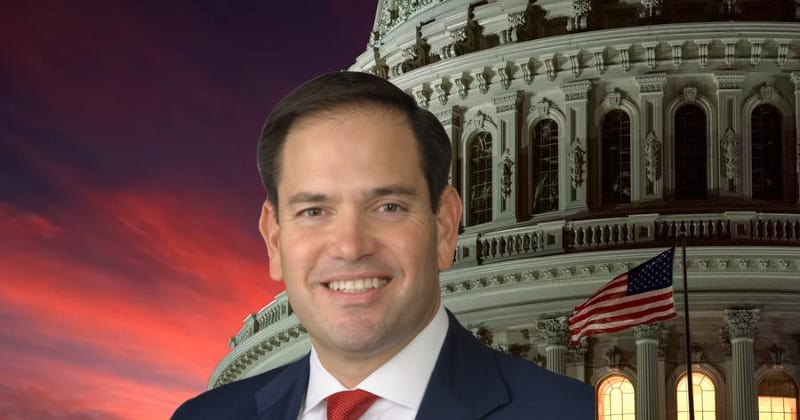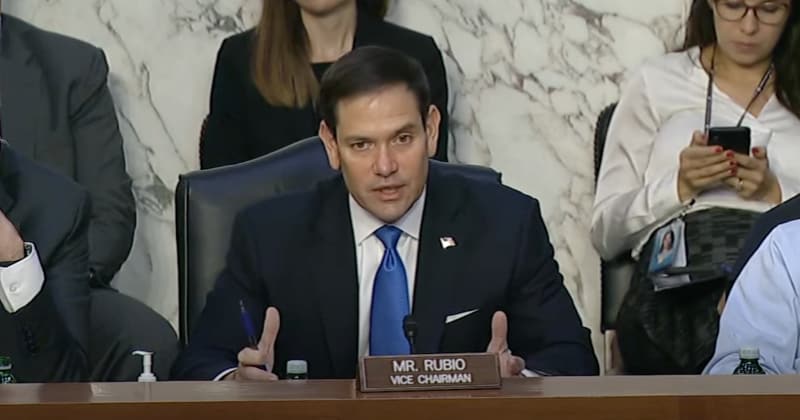On Friday, in Monroe County, U.S. Sen. Marco Rubio, R-Fla., the chairman of the U.S. Senate Small Business and Entrepreneurship Committee, convened a hearing on “Florida’s Coastal Economy: Opportunities and Challenges in the Florida Keys.”
Rubio’s opening remarks as prepared are below:
Thank you all for being here, and thank you especially to our three witnesses.
Today, we will examine the unique opportunities and challenges facing Florida’s coastal economy in the Keys.
These islands boast truly Floridian industries such as fishing, diving and other activities that are directly and indirectly related to tourism. It is a mecca of small businesses that thrive on these industries.
But this enchanting chain also faces many challenges given its proximity to the mainland, and vulnerability to hurricanes.
The Florida Keys are a very special part of this state.
It is a place where generations of families have created traditions and memories on the waters.
This island chain is rich with history, beauty and allure, so it is no wonder that the Florida Keys welcomes tourists from around the country and throughout the world.
In fact, most estimates show that the Florida Keys attracts more than 5 million visitors annually.
Here in Florida, we take pride in being the “Fishing Capital of the World.”
According to the Florida Fish and Wildlife Conservation Commission, there are approximately 4 million saltwater recreationally licensed anglers in Florida, with 2.3 million saltwater licenses sold in the last fiscal year, resulting in more than $37 million in total saltwater license sales.
Saltwater recreational fishing has an economic impact of approximately $11.5 billion and supports 106,000 jobs in Florida.
And according to the National Oceanic and Atmospheric Administration, Florida’s commercial fisheries generate $3.2 billion in income and support over 76,000 jobs.
Monroe County has several federal agency partners, including the United States Coast Guard, the United States Navy, National Oceanic and Atmospheric Administration, and the National Weather Service.
With tourist related industries having such significant impacts on the coastal economy throughout Monroe County, it is vital these important federal partners fulfill their role and uphold their obligation in working with state and county officials.
Having access to weather-related data such as up-to-date weather forecasts, meteorological data, and information pertaining to tides, seas, and storms is imperative to both the safety of Monroe County residents, and to the success of small businesses and entrepreneurs that call the Keys home.
Additionally, NOAA is responsible for the Florida Keys National Marine Sanctuary, which is jointly managed with the state.
The sanctuary protects nearly 3000 nautical miles of gorgeous coastal waters.
The sanctuary is home to more than 6000 species of marine life, and includes a significant stretch of the third largest barrier reef in the world.
While we Floridians have a responsibility to help preserve and protect our state’s natural treasures and beauty, conservation efforts are also vital to the success of the coastal economy.
In addition to my responsibilities here on the Small Business Committee, I also sit on the Appropriations Subcommittees on Commerce, Justice, Science, and Interior and Environment.
While that is a mouthful, they are very important subcommittees for Florida, and I’m proud to say that last week, we were able to approve several important appropriations bills, securing critical funds for Florida.
This includes $55.5 million for Marine Sanctuaries and $7.5 million for the Marine Debris Program.
Coral research and monitoring is also a priority for Fiscal Year 2020, with $400,000 allotted for the U.S. Geological Service to monitor coral diseases and $1 million for the South Florida Geographic Program to monitor coral health.
Additionally, the bill also includes funding for the Coral Reef Program, providing up to $5 million for the agency to work with academic institutions and non-governmental research organizations to establish innovation restoration projects to restore degraded coral reefs.
This is the second year in a row that I have secured explicit funding for reef restoration through the appropriations process.
Last year’s funding law resulted in NOAA issuing two grants worth more than $1.6 million to fund the planting of 114,255 corals within the Florida Keys National Marine Sanctuary by Mote Marine Lab and the Coral Restoration Foundation.
And we all know that without healthy seagrass, it is nearly impossible to have a robust coastal ecosystem.
This year’s funding bill includes $650,000 to enhance water quality and seagrass monitoring in Biscayne and Florida Bays.
Although we have a ways to go before sending these funding measures to the President, I am hopeful this next fiscal year will build upon previous year’s investments.
Working together with partners, our state can ensure visitors and residents alike will have the opportunity to take advantage of world class diving, snorkeling, boating, and fishing for generations to come.
But despite our best conservation efforts, the reality is these great Keys have always been vulnerable to the threat of hurricanes.
This remarkable island chain has endured many storms throughout its rich history.
The most recent being the horrific category 4 monster that struck Cudjoe Key, approximately 30 miles from where we sit today, on September 10, 2017.
Hurricane Irma packed 132 mile-per-hour winds and an 8 foot storm surge and was responsible for many tragic fatalities and caused vast destruction to infrastructure, homes, and businesses.
The economic loss to our state was in the tens of billions of dollars.
According to the Monroe County website, of the 55,000 housing units in the Keys, nearly 1200 homes were completely destroyed, with nearly 3,000 additional homes suffering major damage.
Here in Marathon and in the city of Key West, not a single home had escaped unscathed by Irma.
As chairman of the Small Business Committee, one of my chief responsibilities is to provide oversight of the Small Business Administration.
SBA’s Office of Disaster Assistance offers disaster loans to small business owners, nonprofit organizations, and home owners in declared disaster areas.
In fact, about 80 percent of SBA’s direct disaster loans are issued to homeowners to replace and repair homes and property.
SBA disaster loans include home loans, business physical disaster loans, and economic injury disaster loans.
Disaster survivors may apply for personal property loans of up to $40,000 to replace damaged or destroyed personal property.
And homeowners may apply for loans of up to $200,000 to repair or restore their homes through the SBA.
Businesses and nonprofit organizations can apply for disaster loans of up to $2 million through the SBA after disasters like Irma.
Economic Injury Disaster Loans are available to small businesses to serve the purpose of operating funds until the applicant small business recovers.
Three major hurricanes in 2017, Irma, Harvey, and Maria, accounted for over 145,000 SBA disaster loans processed for $7.4 billion.
And while approximately 80 percent of SBA disaster loans are issued to homeowners, many disaster survivors are understandably unaware that the Small Business Administration issues loans to survivors who are not themselves business owners.
The SBA needs to do a better job of working with local officials and community leaders to get the word out in declared disaster areas that victims and survivors can access these loans.
According to FEMA, roughly 40 to 60 percent of small businesses do not reopen following a disaster.
This is beyond troubling: it’s unacceptable.
When I talk to owners whose businesses have been damaged or destroyed by disasters, they tell me the need for immediate capital is a crucial obstacle to rebuilding and reopening their business.
The Florida Small Business Emergency Bridge Loan Program has been very successful.
But SBA’s Express Bridge Loan Pilot Program has been underutilized and ineffective.
In fact, during Hurricane Irma, the Florida Bridge Loan program received almost 1200 applications and processed 883 loans totaling $35 million.
In contrast, the SBA Express Bridge Loan program has been used less than 7 times as of this past summer according to the Government Accountability Office.
I believe our state’s model for emergency bridge loan funds should serve as an example to other states, and can serve as the example to the SBA of how to improve and enhance its federal program.
We will not turn our backs on victims and survivors of disasters, and we will not let them be forgotten: not in Florida, not in Monroe County, and not here in Marathon.
What this community endured with Irma was both tragic and destructive.
But the perseverance and resiliency of the people who call the Keys home is both remarkable and unwavering.
But to keep the coastal economy on an upward trajectory over the long-term, we all must do our part to help restore the resiliency of the natural ecosystems upon which communities in the Keys rely.
That’s why I introduced the Restoring Resilient Reefs Act, along with Sen. Rick Scott and our two colleagues from Hawaii.
My bill would add, to the NOAA Coral Reef Program, an explicit focus on coral restoration activities where natural disasters and human activities have degraded reef ecosystems.
It also includes directed federal funding and technical assistance so States and impacted communities can drive priorities and management of coral reef ecosystems, and new avenues for the provision of emergency funds to ensure rapid and effective responses to coral reef emergencies, including disease outbreaks, invasive species, coral bleaching, natural disasters, vessel groundings, hazardous spills, and coastal construction accidents.
The House companion bill was introduced by Rep. Soto, and deserves the full support of our South Florida congressional delegation.
Since Hurricane Irma made landfall, the county has gone above and beyond, working with State and Federal agencies to put back the community’s infrastructure.
It’s inspiring to come back and see more and more of the recovery, the rebuilding, and the enduring spirit that has brought this treasured corner of Florida back.
The coastal economy has endured, and will continue to be resilient with our strong efforts to conserve our natural resources, keep our waters clean, and restore our coral reefs.
A resilient Keys coastal environment will continue to be an international destination for those seeking world-class fishing, diving, boating, snorkeling and swimming.
I will do whatever I can to make sure of that.















Pingback: Marco Rubio Holds Hearing on Florida’s Coastal Economy Opportunities and Challenges in the Florida Keys | – Bank News Today